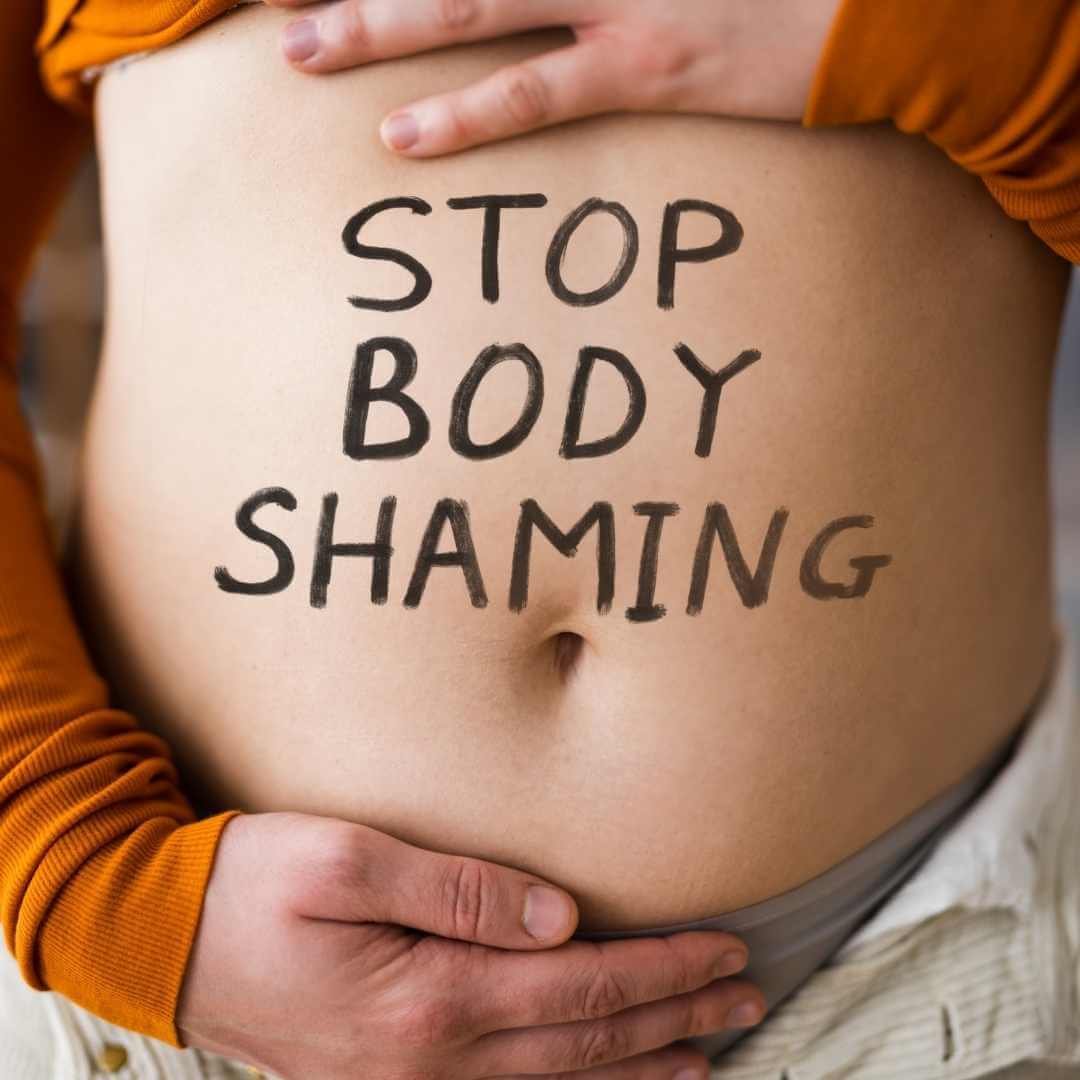The same thing seems to happen every morning. You’re watching your loved one look at themselves in the mirror with scrutiny. “I look disgusting!” they lament. “How is it that you can even stand to look at me?” they continue. A jab at the heart to go through this so often. Looking at this person you love and care about so much, and being so overwhelmed by all of their flaws is heartbreaking. They don’t see themselves the way you do. You don’t see someone that’s disgusting or ugly. You see someone lovely, kind, and compassionate. You can’t imagine a more beautiful person than the one you’re watching shred their appearance apart every single day. It’s like nothing you do or say seems to make a difference at all. You feel discouraged and deflated. No matter how many times you reassure them that they aren’t disgusting, fat, or ugly, nothing changes.
It can feel so helpless to be in this position. Loving someone with a negative body image can be challenging because you want so badly to fix it but it doesn’t matter which angle you take, nothing helps. They can’t seem to see themselves the way you do. I know there are days when you are sad that they feel this way, and I also know there are days when it’s frustrating. Whatever you’re feeling it’s completely valid.
What are the effects of negative body image?
The impact of negative body image can destroy any form of self-confidence or self-esteem you have. People with negative body image avoid social situations or going out because of fear of judgment. They don’t want people to tear their bodies apart in the same way they do. Negative body image has a significant impact on relationships. When a loved one struggles with body image, it doesn’t feel like your opinion or thoughts matter, and they shut you out. The mental health impacts of negative body image are brutal. People with bad body image tend to be more depressed, isolative, and anxious than those that have a more positive body image.
How do I support someone I care about with a negative body image?
The first thing I want you to know about supporting someone you care about that struggles with body image issues is that it’s really more about than what they look like. It comes down to negative beliefs they have about themselves. We live in a world that is driven by thinness and obtaining attractiveness is the most important thing. It’s understandable that your loved one would care about their appearance but when they look in the mirror it’s about more than just the size of their waist. However, most people aren’t consciously aware of that fact. My clients are convinced that it’s really just about wanting to look good. Try to understand this perspective.
Tips for supporting a loved one with a bad body image
There is a lot that you can do to help support your loved one struggling with body image issues. Here are just a few of the suggestions.
Focus on qualities outside of their appearance
A common response that you might have is to reassure your loved one that they are beautiful and that they aren’t fat. I don’t know your circumstances but for some people, this can make it worse. Reassurance-seeking can reinforce this cycle of negative body image. Saying things like “I don’t see the same things that you see about yourself” is a neutral statement without reinforcing the importance of what their body looks like being so important. Focus on sharing the qualities about them that have nothing to do with their body or appearance. Keep in mind this isn’t going to be a magic fix but it’s important to put less emphasis on the body and appearance in general. Your loved one might need help remembering that they are more than a body and what they look like.
Don’t comment on your body or anyone else
It may seem harmless to be critical of your body or other people’s bodies. It may also seem even more confusing why you shouldn’t comment positively on other people’s bodies. We have been trained to believe that this is complementary and a good thing. However, complimenting other people’s bodies continues to place emphasis and importance on appearance. This isn’t helpful to someone that's struggling with body image. Your loved one needs to know there is greater importance on them and other people that have nothing to do with appearance. Avoiding comments can help lessen how important they might seem.
Talk about feelings rather than flaws
When you see your loved one standing in front of the mirror being critical of their body, they are feeling something powerful. You might hear them say, “I feel fat!”. Just so we are clear I went to six years of college in total with 4000 hours of doing therapy before I could get licensed so I feel I can confidently say fat is not an emotion. Fat and ugly might mean the same thing to your loved one as unacceptable and uncomfortable. Encouraging them to talk about how they feel rather than focusing on their flaws can get to the root of their struggle. Talking about how they feel in general will be more helpful than reassuring them that they are beautiful and they look good in that dress.
Learn to listen & validate
The most important thing that you can do for your loved one and their body image issues, is to learn to actively listen. Active listening means that you are paying attention to what they are saying rather than how you want to respond. This isn’t where you give advice or tell them they shouldn’t feel the way they do. Be present and engaged. Show them that you hear what they’re saying. Validate their emotions and experience. Validation doesn’t mean that you agree with what they are sharing. It means that you are trying to understand their emotions and experience. This can help them take down the walls they might have up.
Body Image Therapy can help
As you probably already know, there’s only so much you can do to help a loved one struggling with body image. As I have shared earlier, there’s way more to it than wanting to be thin and beautiful. Body image therapy can help your loved one work through the beliefs they have about themselves and what is holding the importance of looking a certain way. Many women that I have worked with have shared that they were surprised by the things that came up in therapy that helped them recognize the connection. If your loved one isn’t able to make progress with their body image, try not to be discouraged and consider helping them see the benefit of going to therapy.
Start working with a body image therapist in Utah
You don’t have to keep struggling with your body image. You don’t have to hate the person you look at in the mirror or swipe away in disgust when you see a photo of yourself. You can come to a place of not thinking about your body so much. Body image therapy can help. This Utah Counseling Center has a body image therapist specializing in body image therapy. To begin counseling follow the steps below:
Start working with a therapist for body image in Utah
Find peace with your body.
Online Therapy in Utah
It can be hard to find time to attend therapy. Your schedule might not always line up with being able to commute to and from a therapy appointment. Many people put off going to therapy because they don’t think they can make time for it. Therapy can change your life and help you find relieve anxiety and self-hatred. I want it to be convenient and accessible for you. This is why I provide online therapy in Utah. It’s just as effective as in-person therapy but you don’t have to leave your house.
Online counseling allows me to work with you wherever you are in Utah. I work with women living in Salt Lake City, St. George, Logan, Heber City, Cedar City, and more.
Other mental health services in Utah
Body image therapy isn’t the only mental health counseling service offered at this Utah Counseling Clinic. Other mental health services offered by Maple Canyon Therapy include eating disorder therapy, anxiety therapy, binge eating disorder treatment, therapy for birth trauma, and EMDR therapy.
About the Author
Ashlee Hunt is a licensed clinical social worker and owner of Maple Canyon Therapy in Utah. She has been working with women with eating disorders, disordered eating, and eating disorders since 2013 as a graduate student therapist. Ashlee is passionate about empowering women to be more self-compassionate and focus on body neutrality. Ashlee utilizes a health-at-every-size approach to helping women recover and move beyond negative body image. She has a bachelor's of psychology, and a bachelor's in family life and human development from Southern Utah University. Ashlee has masters in social work from Utah State University.











































